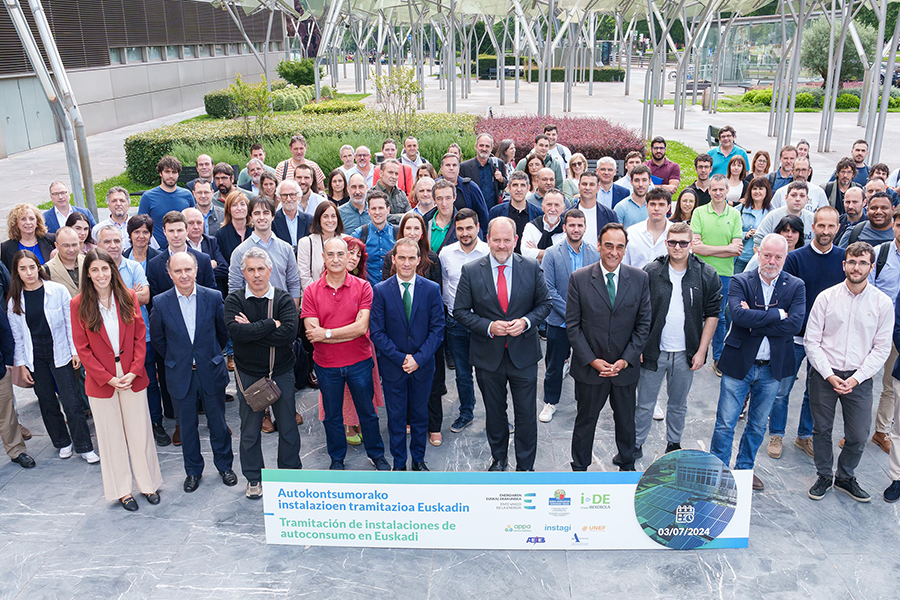i-DE and the Ente Vasco de la Energía bring together the Basque photovoltaic sector to promote the processing of new installations
-
200 representatives of the sector hold a working day to share the new processing processes that will speed up the connection of new installations.
The Basque Self-consumption Working Group is made up of the Installers' Associations, Iberdrola España (i-DE) and the Basque Government.
Self-consumption has experienced a notable boom in the Basque Country with 2,161 installations in 2023 and 830 in the first half of 2024.

The Ente Vasco de la Energía and i-DE, Iberdrola España's distributor, have brought together more than 200 representatives of the photovoltaic sector to present the results of the Basque Self-consumption Committee, which after more than six months of work has reached a consensus with the agents involved to standardize the connection procedures with Iberdrola España (its distributor i-DE), and to speed them up as much as possible.
More than 200 representatives of the Basque photovoltaic sector as a whole met this morning at the conference organized by the Basque Energy Agency to learn first-hand about the results of the work carried out by the Basque Self-consumption Committee, which is of great interest to installers as the measures adopted will standardize procedures and reduce deadlines. To this end, the main conclusions and the working documents drawn up, which will facilitate the processing of new installations with i-DE, were presented.
The conference was attended by representatives of i-DE who presented the process to be followed to process self-consumption installations, as well as key points and good practices that allow to be more efficient in this process. In addition, a round table was held with the participation of the Associations of Self-consumption Installers of the Basque Country, who gave their views on the evolution of the sector and its future prospects.
The Basque Self-consumption Working Group is formed by Iberdrola España (i-DE), the Installers Associations UNEF, APPA, INSTAGI, SEA and AEIEB, together with the Basque Energy Agency and the Basque Government. For more than six months they have held working meetings with the aim of reaching a consensus on processing methods with i-DE which would allow, on the one hand, to be more operative and to have a homogeneous and standardized procedure, as well as to speed up the deadlines so that the installations can be put into operation in a more manageable period of time.
They also addressed the importance of having stable and predictable regulation that guarantees investment in networks to transform the local distribution network of cities and towns into a smart one.
Innovation and digitization of electricity grids will continue to improve the quality of supply and service to citizens, making the energy they consume more efficient.
Self-consumption takes off in the Basque Country
Self-consumption in the Basque Country has not stopped growing exponentially in recent years. The end of the COVID-19 pandemic and the increase in economic activity led to an increase in the price of electricity which, together with the publication of new subsidy programs for these installations, meant that during 2022 and 2023 applications for new self-consumption installations took off notably. This, in turn, strained the market and caused the processing and legalization of projects to take longer, which has led the Basque Energy Agency to convene all the agents to the Basque Self-consumption Board to reach a consensus on solutions and allow a standard processing with more acceptable deadlines.
It should be noted that in the year 2023, a power of 46.2 MW in 2,161 photovoltaic installations for self-consumption were put into operation in the Basque Country, and in the first half of 2024, 30.1 MW of global power in 830 new installations have already been reached.
Photovoltaic self-consumption, an ally against climate change
In recent years, solar panels have become a common element in the urban and rural landscape due to the boom in photovoltaic self-consumption. The boom in this type of self-consumption, which also contributes to the fight against climate change, has come about thanks to technological advances, lower prices for the elements that make up the installation, easier administrative procedures and local and state aid.
